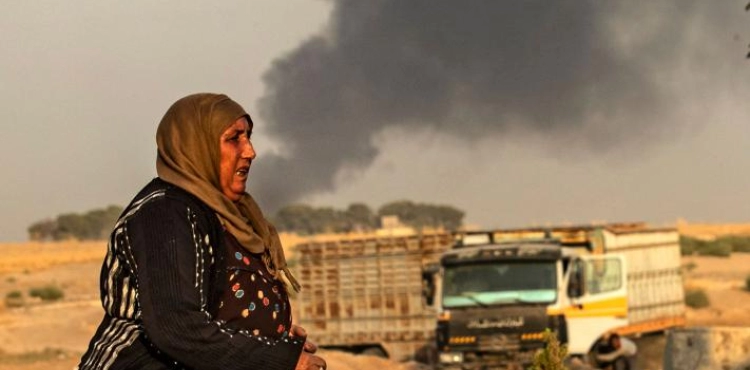Turkey on Wednesday afternoon launched an offensive against US-backed Kurdish guerrillas in northern Syria, targeting several border towns, causing massive displacement of civilians.
The Syrian Democratic Forces, the casualties among civilians as a result of the Turkish bombardment of several areas in northern Syria.
These forces, which are American and Kurdish factions supported by the US, reported on their Twitter account of "heavy shelling by Turkish planes on military and civilian sites in villages in the areas of Tall Abyad, Sari Kaneh, Ras al-Ain, al-Qamishli and Ain Issa."
"Turkey´s armed forces and the Syrian National Army (SLA) are launching Operation Spring of Peace in northern Syria," President Recep Tayyip Erdogan said on Twitter.
He said the operation was aimed at "terrorists" of the YPG and the Islamic State (IS).
Shortly after Erdogan´s tweet, shelling began in the border town of Ras al-Ain, an AFP correspondent said, who saw clouds of smoke and dozens of civilians fleeing through their cars and motorcycles, while others left on foot with their belongings and children.
The news agency "Anatolia" government that Turkish artillery bombed targets of Kurdish units in the border town of Tal Abyad, more than 100 kilometers from Ras al-Ain.
"The Turkish warplanes started launching raids against civilian areas," Mustafa Bali, a media official in the Syrian Democratic Forces, said on Twitter, referring to a state of "panic" among people.
According to the Syrian Democratic Forces, Turkish air raids hit "military and civilian sites in villages in Tal Abyad, Sari Kaneh (Ras al-Ain), al-Qamishli and Ain Issa."
Amnesty International on Wednesday warned parties to the conflict not to target civilians and civilian objects. "Turkey has an obligation under international humanitarian law to take all necessary measures to protect civilians and ensure humanitarian access," said Middle East Research Director Lynn Maalouf.
The attack, which was opposed by European Union countries and denounced by Damascus and its ally Tehran, aims to create a "safe zone" separating Kurdish-controlled areas from its borders, allowing the return of some 3.6 million Syrian refugees who fled to escape the eight-year conflict. .
This is the third attack by Turkey with pro-Syrian Syrian factions in northern Syria, after an attack in 2016 in which it took control of several border cities, and a second in 2018 took control of the Afrin area in northern Syria.
Ankara considers Kurdish units "terrorist" and considers them an extension of the PKK, which has been waging an insurgency against it on its territory for decades.
Turkey began aerial bombardment despite a senior State Department official said on Monday that US forces in the area had closed the airspace to Turkish planes.
"We have no intention of changing that any time soon," he said, but Washington´s withdrawal of 50 to 100 troops from the northern border on Monday seemed like a green light for Turkey to launch its offensive and raised fears among Kurds who called for a no-fly zone in northern Syria.
The Kurdish autonomous administration pre-empted the start of the offensive by declaring Wednesday morning the "general alarm" in its areas of control. It called on its citizens to do their "moral duty and to show resistance in these sensitive historical moments."
In a remarkable position, the self-government on Wednesday appealed to Russia to play the role of "guarantor" in the dialogue with Damascus, after Foreign Minister Sergei Lavrov announced his country´s contacts with the Kurds and the Syrian government and "urge them to start dialogue to resolve the problems in this part of Syria."
In a statement, the self-administration welcomed Lavrov´s remarks. She stressed the aspiration that "Russia has a role in this aspect supportive and guarantor and that there will be real practical results."
Previous Damascus-led negotiations with the Kurds on the fate of their regions have made no progress, with Damascus insisting on restoring the status quo ante before the conflict broke out in 2011, and the Kurds sticking to their own administration and institutions.
US support for the SDF, which controls about 30 percent of the country, angered Damascus, which has vowed to counter any Turkish attack, blaming the Kurds for what happens as a result of their alliance with the Americans.
Trump´s decision to withdraw his troops from the northern border drew widespread criticism from US politicians and even senior Republicans, as it was seen as a departure from Kurdish forces, a key ally of Washington in its fight against ISIS.
"We may be leaving Syria, but we have not abandoned the Kurds in any way," Trump said on Tuesday.
In a telephone conversation, Erdogan confirmed on Wednesday to his Russian counterpart Vladimir Putin that the Turkish operation against Kurdish forces in Syria, "will contribute to bringing peace and stability to Syria and facilitate a political solution."
The Kremlin reported that Putin called on Erdogan to "think carefully" before launching the attack.
France strongly condemned the Turkish attack and asked for a meeting of the Security Council, at a time when the President of the European Union Jean-Claude Juncker in the European Parliament, "I call on Turkey and other parties to act with restraint and stop the current operations."
Senator Lindsey Graham, a Republican close to Trump, has vowed that Congress would make Turkey "pay dearly" for its attack.
Arab League Secretary General Ahmed Aboul Gheit said that the operation "threatens the territorial integrity of Syria and opens the door to further deterioration in the security and humanitarian situation" in Syria.
Several European countries, including France, feared that the attack could contribute to the revival of the Islamic State again as Kurdish fighters turn to Turkey.












